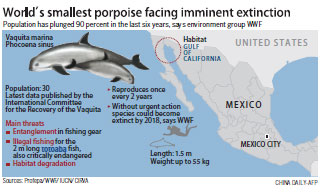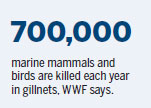Vaquita porpoise could be extinct by 2018: WWF

MEXICO CITY, Mexico - The vaquita marina, a tiny porpoise native to Mexico, could be extinct by next year if urgent action including a ban on gillnets is not taken, the World Wildlife Fund for Nature warned.
Fewer than 30 of the rare mammals still live in the wild, all in the upper Gulf of California, the WWF said in a report on Monday.
The vaquita population has plummeted 90 percent in less than six years, down from 250 in 2011.

"If we don't do something today, the vaquita could be extinct by 2018," said Maria Jose Villanueva, director of strategy and science for WWF Mexico. "Losing it would be like losing a piece of Mexico."
Villanueva told reporters that the only known threat to the survival of the vaquita - "little cow" in Spanish - are gillnets, long walls of netting hung vertically that trap fish by the gills when they swim through.
The nets are meant to illegally catch totoaba, an endangered fish about the same size of the vaquita.
Smugglers ship dried totoaba swim bladders to Asia, where they fetch up to $20,000 per kilo. Totoaba bladder is consumed in soup or used for medicinal purposes.
Gillnets also catch a large number species that are not targeted. The WWF says the nets accidentally kill some 700,000 marine mammals and birds around the world each year.
Some 374 gillnets have been removed in the Gulf of Mexico between February 2016 and April 2017, but the vaquita population continues to drop - six have been reported to have died this year alone, Villanueva said.
The Mexican government's two-year ban on gillnet use is set to expire in less than two weeks.
Mexican environmental authorities and conservation groups are working on an emergency plan expected to begin around September to move the vaquitas to a "temporary sanctuary" where they can safely reproduce.
In its report, titled "Vanishing Vaquita: saving the world's most endangered marine mammal", the WWF called on the Mexican government to clamp down on the totoaba trade, and to commit to a plan "for the recovery of the vaquita within its natural habitat that includes specific population increases and timelines."
The conservation group also called on the US and Chinese governments to collaborate with Mexico "to halt the illegal fishing and trade of totoaba" by increasing efforts to "intercept and halt the illegal transport, entry and sale of totoaba products."
Agence France-presse

























